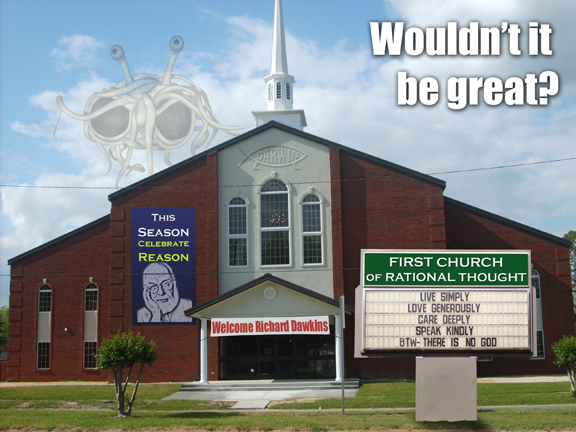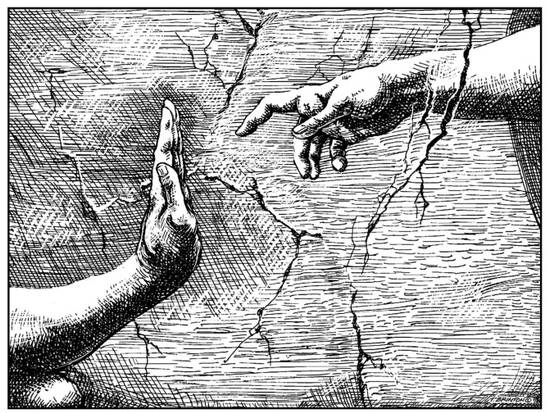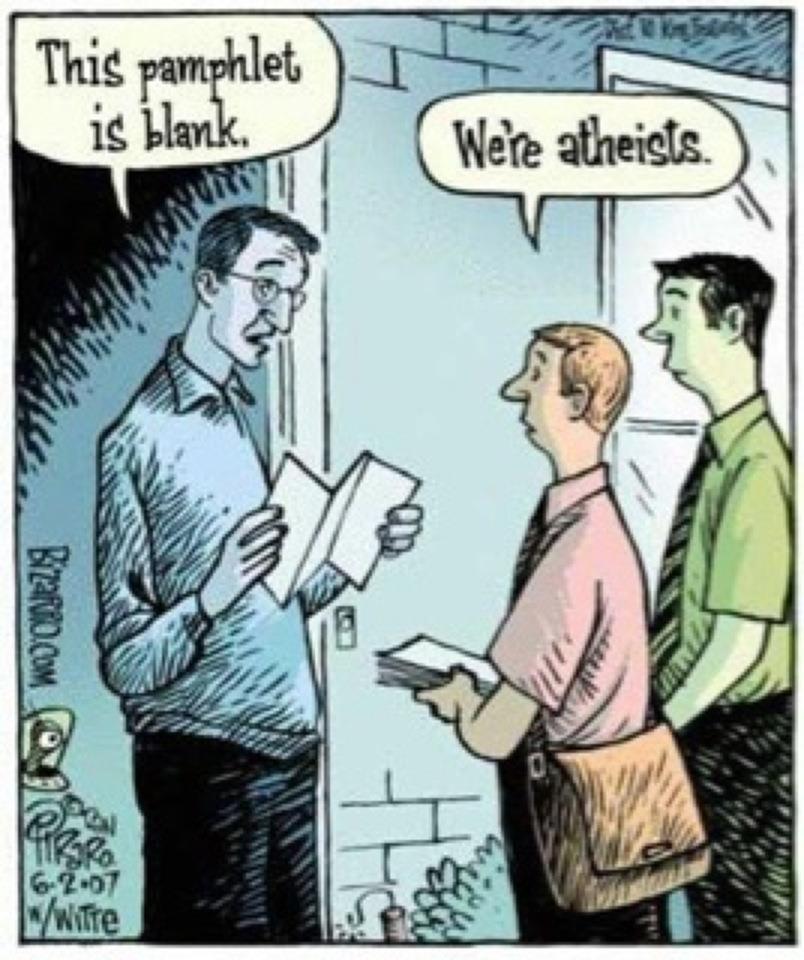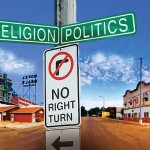This is the first of a 3-part series that explores the relationship between spirituality, religion, and church. In Part 1, I discuss the Sunday Assembly, which strives to be a church without religion, and how it is different from the UU. In Part 2, I try to explain what’s missing from religionless churches like the Sunday Assembly and the UU. And in Part 3, I explain how Paganism might be an answer to the longing of Nones for religion without church.

What is the Sunday Assembly?
I recently read a comment by an irate atheist who asked (rhetorically) “What real benefits does religion provide that cannot be had by secular means?” And my mind went immediately to the Sunday Assembly.
Last year, I attended one of the first gatherings of the Sunday Assembly in Chicago. If you’re not familiar with it already, the Sunday Assembly, informally dubbed “the Atheist Church”, was founded in 2013 in the UK and rapidly spread to the US. It claims to be “all the best bits of church but with no religion and some awesome pop songs”.
I’m an atheist (sort of), a humanist, and a skeptic. I like upbeat music. And I want to have something to do on Sunday mornings. And I’m not completely satisfied with the Unitarian church. So I thought the Sunday Assembly might be a good fit for me. Maybe more than anything else, I was intrigued by the SA’s motto, “Live Better, Help Often, and Wonder More” — especially the “Wonder” part.
So one Sunday, I took my kids to check out the fledgling Sunday Assembly in Chicago. The SA service has been fittingly described as “part karaoke, part aerobics class, part comedy show“. It was fun. The music was good. I especially liked a song called “Joseph’s Song” sung by Bruce Holmes, which is sung from the perspective of Jesus’ putative nonbeliever step-father. I don’t recall strongly disagreeing with anything that was said during the service, and there was a minimum of bashing of believers.
Still, I was disappointed. For one thing, I heard plenty about “living better” and “helping often”, but nothing that caused me to “wonder more” — which is pretty much how I feel about the UU congregations I’ve attended (five so far). In fact, the Sunday Assembly has a lot of Unitarians scratching their heads and asking themselves, “Isn’t that what we do?” As far as I can tell from my single encounter with the SA and everything I’ve read about them, the Sunday Assembly differs from the UU in three ways.

Boundary Maintenance
First, the Sunday Assembly is more exclusive than the UU — at least they started out that way. At the Sunday Assembly I attended, one speaker explicitly distinguished the SA from the UU by explaining that the UU does not limit itself to atheists, while the SA does. This is consistent with the explanation on the SA’s website and with the explanation given in another article linked here.
There’s been some controversy over the extent to which they want to be known as the “Atheist Church”, and there’s actually already been a schism created by those for whom the SA is not atheist enough. I’m actually disappointed to see the SA now styling itself as “radically inclusive”, not only because I doubt it, but because the explicit atheism of the SA was the probably the most credible basis they have for distinguishing themselves from the UU. While I value the inclusiveness of the UU, it is difficult to create a sense of community in a congregation that includes (but is not limited to) “stanch” humanists, Buddhists, Pagans, Christians, and ABC (Anything-But-Christians).
Like it or not, communities need boundaries, even if they are permeable boundaries. It needs to be more or less clear, both to people on the inside and people on the outside, what the difference is between being on the “inside” and being on the “outside”. The SA has does this by focusing on atheism. Admittedly, this would probably exclude me. I’ve called myself an “atheist” when I want to distinguish myself from monotheists and polytheists, but the truth is that about as close as I get to atheism is pantheism, which is probably not atheistic enough for the SA crowd. And I suspect that my Paganism would not fly with the SA folks either, even if it is of a humanistic variety. Nevertheless, I like that the SA has clear sense of identity, something which the UU lacks sometimes, and I think it would be a mistake to try to be more inclusive. In fact, I would probably still go to the SA (and keep my peace about my Paganism) if they got some other things right.
Rock and Holy Roll
The second way the SA differs from the UU is that the music is more contemporary. In fact, they sing pop songs — which I think they hope will be a big draw. I found the SA’s use of pop music to be both appealing and discomfiting. On the one hand, I felt that the pop songs were better at evoking the kind of enthusiasm that I would like to see in a Sunday service than some of the more traditional music played at the UU. On the other hand, the pop songs weren’t as good at evoking a sense of sacredness, which I also want to see in a Sunday service. Striking the balance between reverence and mirth is difficult, but essential, I think.
I have a theory that what is missing from the UU is the experience of self-transcendence or corporate self-forgetting. One of the most effective ways to do this is through music. It’s no coincidence that, when UU’s talk about what “spirituality” means to them, a lot of them are likely to mention music. The UU does have some great music. In my opinion, some of the best of it is from other traditions, including African-American spirituals, like “There is More Love Somewhere” (#95) and “When the Spirit Says Do” (#1024), “Bring out the Festal Bread”(#120), based on a Hebrew folk song (which we sang for Passover), and Alhamdulillah (#180) (which we sang for Ramadan). But there are plenty of dirge-like hymns adapted from 19th century Protestantism in the UU hymnal too, and these just don’t seem to raise the “energy” in the same way.
The SA’s solution to the music question is to use pop songs. This is played up in nearly every news report I’ve read about the SA. But while Bon Jovi’s “Livin’ on A Prayer” and Gloria Gaynor’s “I Will Survive” do get the blood flowing, using them in a sacred context can be tricky. There are pop songs that my family uses in our Pagan rituals. The song, “O-o-h Child” by the Five Stairsteps has become a religious song in our family, for example. And singing “Lean On Me” with my UU congregation has been a sacred experience. But, there is a difference between using a pop song to raise the energy in a sacred space and allowing a pop song to turn sacred space into mundane space. And it seems to me that the SA just doesn’t know the difference.

The Sacred and the Secular
And that brings me to the third, and for me, the pivotal difference between the Sunday Assembly and the UU. The SA seems to have no conception of sacred space. No effort is made to set the space or the time apart from mundane space and time. While the UU had stripped its liturgy down considerably, even by Protestant standards, there are still many of the elements which have the effect of creating sacred space and time. There’s no prayers and no invocation of deity, but UUs still mark the beginning of the service with prelude music, a group recitation of the community covenant, and the lighting of the the chalice candle. The end of the service is marked the same way.
The SA had none of this. If I had walked in off the street, there would have been nothing to suggest to me that this was a sacred place or moment. And I think this was intentional, as their frequent use of the term “secular” to describe themselves suggests. While there are undoubtedly things that SA secularists find sacred, they do nothing to cultivate that sense of sacredness in their Sunday service.
I think it all comes down to the fact that the Sunday Assembly wants to be “all the best parts of church but without the religion”. But like fellow Patheos blogger, David Mason, I think the SA has got it backwards. What I am longing for is not “church without religion”, but “religion without church”. And I don’t think it’s just me. In fact, I wonder if maybe the growing numbers of “Nones” aren’t looking for the same thing. If I’m right, this would go a long way toward explaining why the Nones aren’t flocking to the Sunday Assembly … or the UU, for that matter.
What I mean by “religion without church” will be the subject of my next post.















